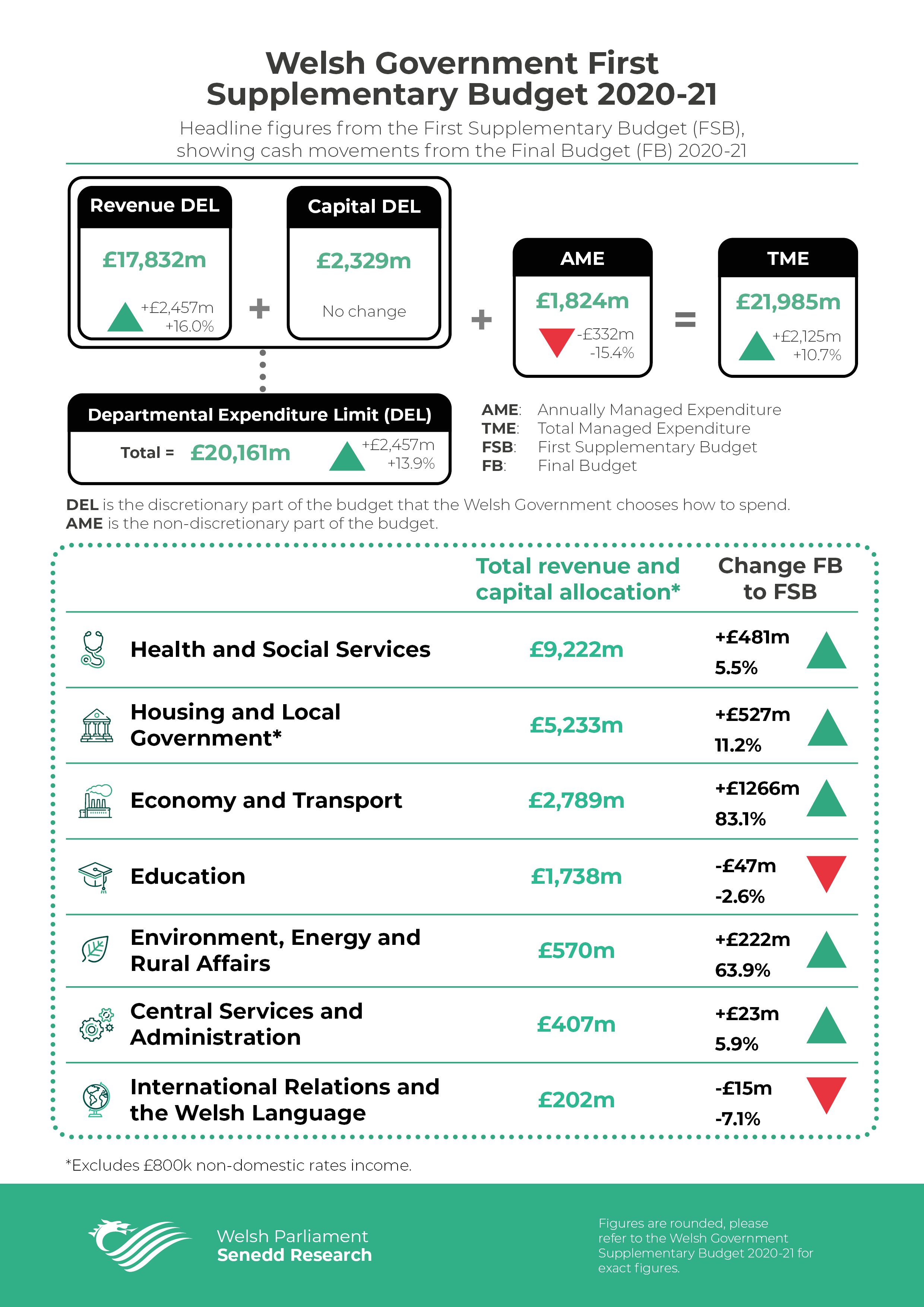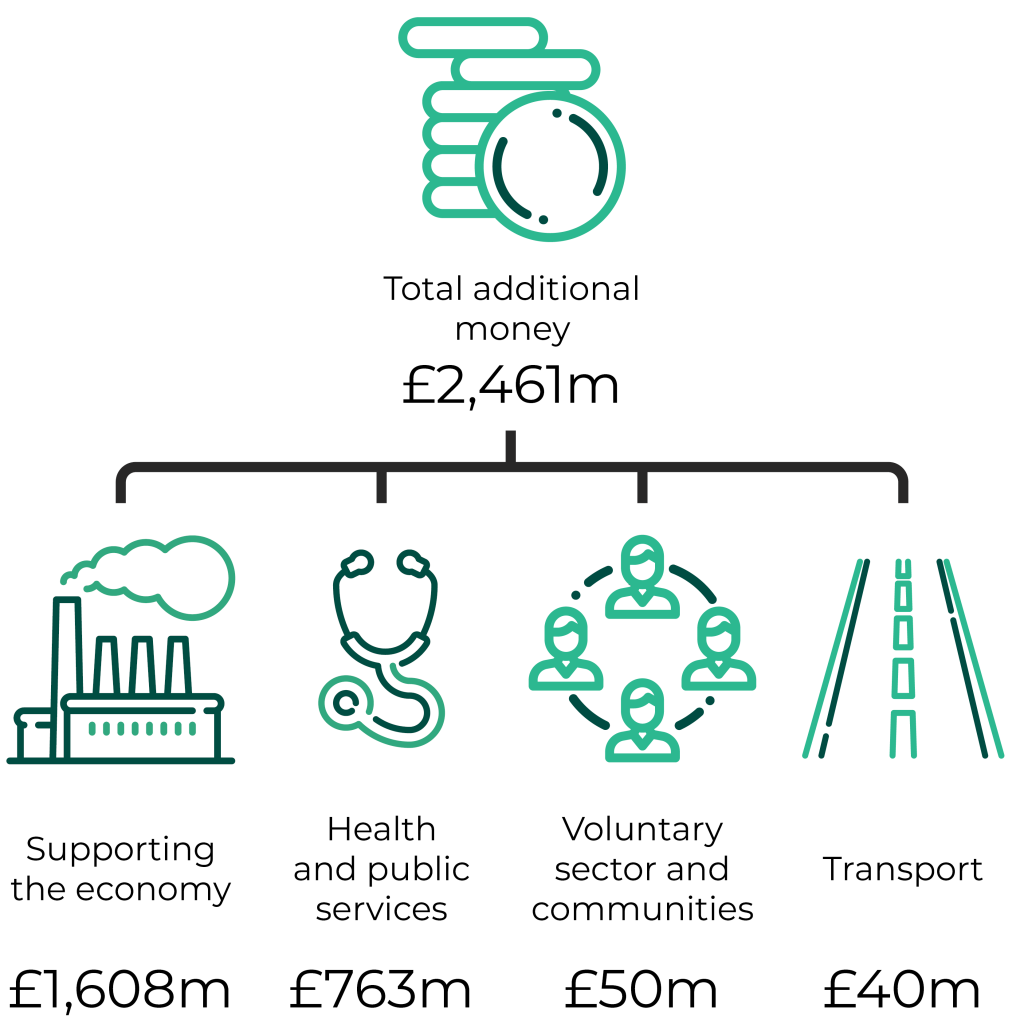The First Supplementary Budget 2020-21 (published 27 May) includes significant allocations relating to coronavirus, allocating an extra £2.5bn to Welsh Government departments.
Compared to the Final Budget 2020-21, the overall funds managed by the Welsh Government have increased by over 10% to £22.0bn (this includes Annually Managed Expenditure, which is a non-discretionary element within the budget).
The First Supplementary Budget is generally a technical event. However, the 2020-21 Supplementary Budget brings together many of the announcements made by the Welsh Government over the course of the coronavirus pandemic.
Funding Allocations
The graphic below shows the increased allocations to departments following the Supplementary Budget:

Some of the significant allocations (including reallocated and reprioritised funding) in the Supplementary Budget include:
- Support for the economy, including:
- over £1.2bn for business rates relief and associated grants; and
- the £500m Economic Resilience Fund (ERF).
- A number of allocations to Health and Social Services, including:
- £166m for field hospitals;
- £91m for staffing;
- £100m for Personal Protective Equipment (PPE);
- £21.3m for other additional NHS equipment and consumables;
- £57m for the Welsh Government’s Test Trace Protect strategy; and
- £40m to make a one-off payment of £500 for all care home and domiciliary care workers.
- Support for public services, including £188.5m through the Local Authority Hardship Fund.
The Welsh Government has categorised its additional expenditure in the Supplementary Budget under four headings, outlined below:

Changes to financing
The amount of fiscal resource (excludes non-cash) available to the Welsh Government has increased by £2.3bn compared to the Final Budget 2020-21. The majority of this increase is associated with consequential funding linked to the UK Government’s coronavirus response.
Consequentials resulting from UK Government policy made in devolved areas amount to £1.9bn. There are also £122.8m of non-COVID-19 related consequentials from the UK Government’s March 2020 budget, as well as other sources of finance.
General capital funding reserves have also increased by £145.5m.
In terms of tax revenues, there has been a net reduction to forecast devolved tax revenues of £27m. This follows Office for Budgetary Responsibility (OBR) forecasts published at the time of the March UK Budget.
Repurposing and reprioritising budgets
To fund its response to coronavirus, the Welsh Government reviewed its existing budgets, identifying £256.2m of revenue to return to reserves to be redeployed. The Welsh Government is also working on the assumption that up to £245.0m of EU funding could be repurposed.
The Supplementary Budget notes that reprioritisation “has required difficult choices”. Expenditure that falls under three categories has been protected:
- expenditure which protects the lives of citizens;
- is in areas where there is a legal or statutory commitment to deliver; or
- is in areas of Welsh Government priority.
The Supplementary Budget states that the Welsh Government has sought to minimise the impact of this exercise. It has tried to identify where funding cannot be used for its intended purposes, or where new activities planned during 2020-21 have not started and can be deferred to a later date.
The £256.2 million funding returned to reserves by the Main Expenditure Groups (MEGs) includes £114m within Health and Social Services, £50m within Economy and Transport and £46.6m within Education. The remaining £45.6m was returned by the other four MEGs.
As well as identifying funding to be for redeployment, the Supplementary Budget notes Ministers have also reprioritised their spending plans within MEGs.
Future funding flexibilities
With the pandemic ongoing and recovery now a key consideration, the Welsh Government has been exploring how it can increase flexibility in its financing options. The Minister for Finance and Trefnydd, Rebecca Evans, is seeking additional powers from the UK Treasury in three main areas:
- Reserves: While the Wales Reserve can hold £350m, there is an annual limit on the amount that can be drawdown (£125m for revenue and £50m for capital). The Minister is seeking flexibility to drawdown more from the Wales Reserve and carry over more funding from one year to the next, if necessary.
- Borrowing: The Welsh Government also has limits on its borrowing (£150m a year, £1bn total). The Minister is seeking to increase these limits suggesting this would allow the Welsh Government to respond more quickly to the pandemic and recovery.
- Switching capital to revenue: The Welsh Government is seeking the authority to switch capital funding to revenue. There is a distinction between revenue (day to day expenditure) and capital (one-off expenditure, such as infrastructure) budgets. Switching resources from capital to revenue would increase the budget of one at the cost of the other. However, the Minister has noted that “every penny that we switch from capital to revenue is money that we're not investing in that work on infrastructure and all other kinds of capital spend, which is so important in terms of the recovery”
Ultimately, any decisions around changing the rules around reserves, borrowing and switching capital to revenue would be subject to negotiation with the UK Government.
What next?
The Finance Committee scrutinised the Minister on 4 June and published its report on the Supplementary Budget on 18 June (PDF, 1.5MB). The Supplementary Budget will be debated in Plenary on Wednesday 24 June. You can watch it live on SeneddTV.
Funding announcements will likely continue, with measures still being taken in response to the coronavirus pandemic. Any additional consequentials will be confirmed in UK Supplementary Estimates. Details of changes to Welsh Government spending after the First Supplementary Budget will be reported in the Welsh Government’s Second Supplementary Budget, due later in the financial year (usually around February).
Article by Owen Holzinger, Senedd Research, Welsh Parliament
We’ve published a range of material on the coronavirus pandemic, including a post setting out the help and guidance available for people in Wales and a timeline of Welsh and UK governments’ response.
You can see all our coronavirus-related publications by clicking here. All are updated regularly.






